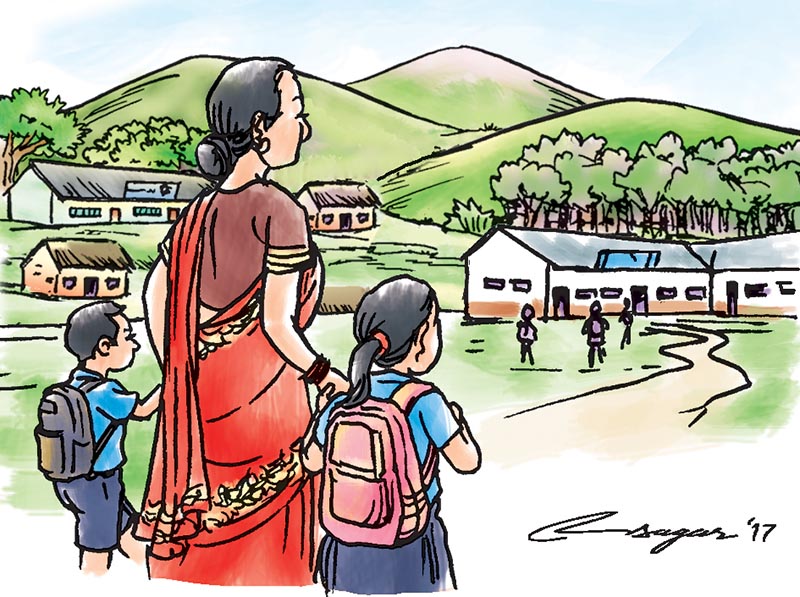Government schools: Much room for reform
Appointing credible heads loyal to the school and adeptly ensuring that teachers are doing justice to their jobs is another much needed initiative. The more a situation is taken seriously, the better efforts are made to improve it
Education plays a fundamental role in the development of a country. Nevertheless, this awareness is yet to seep into countries like Nepal. Nepal is ranked 136th in the world for its literacy rate. The success rate of SLC students passing through government schools lies between 30 to 50 percent and 80 percent of the population still enroll in these schools. This low success rate makes us wonder about the quality of education the government is providing. An alarming 21% of the population is below the poverty line. The massive earthquake that struck the country in 2015 remains a major reason for pushing almost a million Nepalese below the poverty line.
Keeping in mind that educational outcomes are highly influenced by an individual family’s income, the right kind of education seems like a step that could take over poverty. The government of Nepal has been working on improving the school system. These public schools have given a chance to the unfortunate to send their little ones to school. They send their children to these schools with the hope that shortly they would bring about a change in the household. Anyhow, due to the negligence of the faculty of such schools, these parents don’t see their dreams come true. In some cases, due to the dearth of money, these kids are sent to work at a very tender age. This gives rise to another enormous problem of our nation, child labor. And eventually all reasons combined to lead to the vicious cycle of poverty.
Just opening schools and promoting the idea of education is not sufficient, it is essential to monitor the entire system. I have recently begun teaching students at a government school as a volunteer and this has helped me look at the shortcomings of public schools. The school has mediocre teaching staff who have high absenteeism because of their involvement in politics. When I observed the working of the school and talked to a few students, it came to my knowledge that the teachers spend most of their time merely sitting in classes and chatting with other teachers. Such encounters speak volumes about the kind of attention students must get. There is a huge lack of support from the teachers. During classes, the children act like passive listeners. Such minimal interaction between the teachers and students is another reason for this situation. It is disheartening to see a majority of government teachers still carrying and using sticks as a way to threaten students who misbehave.
The entire schooling system purely uses the method of memorizing. Students studying in grade V in these schools cannot read or understand basic English from books issued to them. Keeping in mind that they do not lack potential, it is the system to be blamed for the low performance. Practical understanding of what they are learning is non-existent. The system is such that students are promoted if they have high attendance regardless of them failing or passing. These students generally belong to uneducated families who cannot help them and can’t even get help from the tutors available outside school because their fees these students cannot afford. The only help these kids can get, is from the school where unfortunately some students face discrimination on the basis of social and economic background, gender and, race.
Another issue that needs to be addressed is a lack of resources. Availability of essential and quality resources is a barrier yet to be crossed. Classrooms only have a board and occasionally some posters. There isn’t much incentive for the kids to get excited about school which could be done by providing visual aids that make children more interested in learning new concepts. Children use a particular textbook which is issued by the government and are expected to buy their notebooks and pencils. The system does not even allocate funds for such essential amenities, and therefore those who forget notebooks or pens may be left with nothing to do during the lesson. There are some schools with resources at their disposal; however, these resources are either locked away in cupboards or just forgotten. A few government schools also have libraries, but students aren’t given access to use the books. Donations made by thoughtful people go unused due to lack of proper training and laziness.
The intervention of the government in the matter of education is necessary for a brighter future of our nation. A difference in the schooling system can only be seen if the mindsets of the teachers and higher authorities change. Government must motivate parents to send their children to school by assuring them that proper education is a seed they sow which they will reap as a brighter future for their children and the nation as a whole. This can be done through the right type of incentives. One initiative to improve and sustain quality education could be to fund students and their families rather than fund teachers. As Nepal government provides numerous subsidies to different government institutions, they can provide those funds directly to students, who can then use the money to finance their preferred school. Appointing credible heads loyal to the school and adeptly ensuring that teachers are doing justice to their jobs is another much needed initiative. It is obvious that the more a situation is taken seriously, the better efforts are taken to improve it. Therefore, a matter as sensitive as education should be given high importance.






